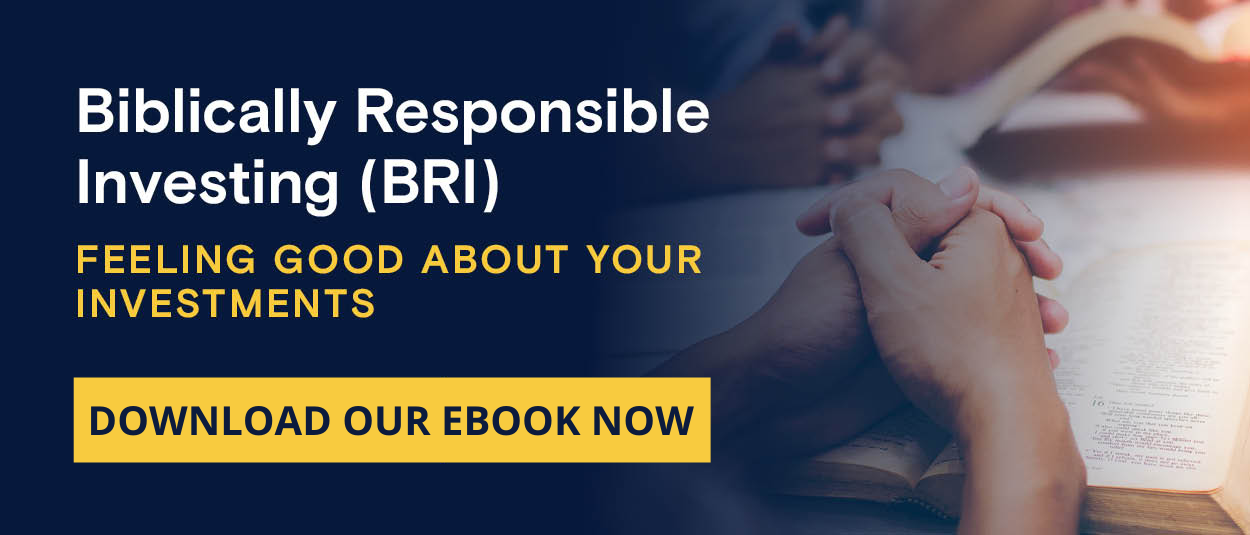Biblically Responsible Investing
JOIN THE BIBLICALLY RESPONSIBLE INVESTING MOVEMENT.

As Christians, we strive to glorify God through our daily lives, but when was the last time you looked at the morality of your investments? You might never willingly hand your money over to a company that supports abortion or pornography, yet you can unwittingly place your money in the hands of companies that do exactly that by giving them your investment dollars.
Biblically Responsible Investing (BRI), is a Christian movement that aims to align our investments with Biblical values. By avoiding companies that are engaged in immoral practices, we glorify God with our finances as well as our daily actions.
PAX Financial Group is proud to be one of the investment firms in San Antonio, TX to embrace this concept and provide this option for our clients.
Are you ready to join the Biblically Responsible Investing movement? Here’s what you need to know.
What is Biblically Inspired Investing?
Biblically inspired investing is a branch of faith-based investing. In faith-based investing, you invest in accordance with your religious beliefs. For Biblically inspired investors, the faith in question is Christianity and the guide is the Christian Bible. Check out our article in Forbes Magazine.
You may have heard of Socially Responsible Investing (SRI), but SRI doesn’t have the depth of application that Biblical investing brings. With SRI, the objective is to avoid what society views as “sin stocks.” The trouble is that modern society tends to take a fairly liberal view of sin. While SRI may exclude companies engaged in the tobacco, weapons or gambling industry, it may promote those that financially support pro-choice movements, for example.
Biblically inspired investing avoids companies with any degree of participation in activities that don’t align with Biblical values. If a company spends time and money on an activist agenda that is not in accord with Biblical values, it doesn’t belong in a Biblically inspired portfolio.
How to Get Started with Biblically Inspired Investing
Aligning your investments with your Christian values doesn’t need to be hard. It starts by uncovering the truth about the investments you own. Take a close look at the companies in your portfolio, including those within the mutual funds or Exchange Traded Funds (ETFs) you own. How do those companies make money? Do they use slave labor? Are they manufacturing abortion drugs or selling pornography?
Beyond just how they make their money, also consider how companies spend their money. Even if these companies aren’t directly engaged in immoral practices, their chief executives may be. Do they donate to Planned Parenthood? Do they lobby to promote agendas that do not align with your Christian values?
If digging into the moral practices of all your investments sounds daunting (it certainly can be), don’t worry; you don’t have to go about it alone. While not every financial advisor is trained or equipped with the tools and resources necessary to truly build a Biblically responsible portfolio, there are those who are, financial advisory firms like PAX Financial Group. We have the analytic technology to delve into the reports and activities of companies for you.
Once you’ve begun to uncover how your current investments stack up against Biblical values, you can find ways to make your portfolio more conscience-friendly. While many companies won’t measure up against Christian morals, there are many that will. There are also a growing number of Biblically responsible mutual funds and ETFs, as well as other professionally managed investment vehicles available.
Once you’ve identified companies and funds that do meet BRI criteria, building a portfolio becomes the same process as anytime you invest. The only difference is that now you’re investing universe is populated only with companies that glorify God.
A Guide to Faith-Based Investing: 3 Steps to Getting Started
ETFs Cater to Socially Responsible Investors; PAX Weighs in on the Trend
Is a Biblically Responsible Investing Strategy Right for You?
Four Factors to Consider Before Using a Biblically Responsible Investing Strategy
The 10 (Investment) Commandments
So, what makes a “good” investment from a Biblical perspective? Here are 10 Investment Commandments that good Biblically responsible investments should support:
- Pro-Life
- Ethical Labor Practices
- Family-Friendly Entertainment
- Christian Marriage
- Sobriety
- Good Stewardship
- Family Planning Values
- Environmentally Friendly Causes
- Positive Social Impacts
- Fair and Equal Pay Standards
7 Investing Sins
While we may know the “right” thing to do, many of us still struggle to do what we know is right. This struggle manifests in investing as well.
We see this in behavioral investing – investors have a tendency to let emotional and psychological biases negatively influence their investment decisions. These biases include loss aversion, wherein investors feel the pain of financial loss more strongly than the joy of a financial gain, which can lead them to investing too conservatively. Anchoring occurs when we latch onto a previous piece of information and cling to it rather than accepting the situation may have changed. Similarly, recency bias causes us to think the market will continue as it is today, when in reality, no one knows what tomorrow will bring.
These core biases can lead to many investing pitfalls, but there are ways to prevent them. Here are 7 investing “sins” to avoid so you don’t end up making a bad investment:
- Not investing in accordance with your values.
- Not having a written plan.
- Thinking of your investments as a single unit.
- Following the herd.
- Thinking too short-term.
- Not automating your investments.
- Not working with a financial advisor.
Challenges to Biblically Inspired Investing
The biggest challenge with Biblically inspired investing is finding investments that align with your Christian morals. It’s hard enough to determine if a company is a good financial value, let alone if it’s a morally correct one.
Understanding if a company is in-line with Christian morals involves investigating not only how the company makes its money but also how it spends its money and uses its influence. A company that produces moral products may still support campaigns for immoral actions. Likewise, even if a company is not directly involved in immoral practices, its chief executives or board members may be. How does an investor delve into all these potential avenues of conflict?
As we discussed above, the good news for Biblically responsible investors is you needn’t do it all on your own. There are resources to help you: From Christian advisors to Biblically responsible funds. Really, the greatest challenge then becomes identifying the right resources to use. Make sure to do your homework and research the financial advisor or financial advisory firm you choose to work with to ensure your best interests are put first.
Investing Seem Easy? Exciting? Fun? 5 Challenges to Getting it Right
Passing on Your Financial Values
Leaving a legacy is a common goal for investors, but for Biblically responsible investors, leaving a legacy takes on all new meaning. More than just leaving your heirs with financial resources to help them improve their lives, Biblically responsible investors have the power to leave their heirs with a set of financial values that help future generations create as much good with their resources as you have.
Passing on your financial values is not as simple as giving a portfolio of Biblically responsible investments. Once those investments are in your heirs’ hands, there is nothing to stop them from trading them in for other, less-moral investments – unless you impart your values as well.
The first step to passing on your values is to clearly define those values. This will help you better communicate them to your heirs. Try to encourage and maintain an open dialogue. Having an ongoing dialogue with your family and heirs can help you all come together in your goals for your finances. Just as you would discuss the Bible with your children, you can also discuss how the Bible has led you to make the financial choices you have made.
The Right Financial Advisor
A Christian financial advisor can be a major asset in your quest to align your investments with your values. But remember, not all financial advisors are the same. In addition to ensuring the financial advisor you work with is experienced and knowledgeable in their field, make sure they also understand Biblically responsible investing and its importance to you.
A good place to start is to make sure you’re working with a fiduciary financial advisor. Fiduciaries are required to put your best interest before their own at all times. A fiduciary advisor must recommend the best investment for you, even if doing so goes against the advisor’s own best interest, such as a hefty commission for “selling” you a specific product. Financial advisors who do not act as fiduciaries need only recommend investments that are “suitable.” This means they could suggest a more-expensive investment that may work for you because doing so would earn them a nice commission.
With a fiduciary Christian financial advisor in your corner, you can see just how easy Biblically Responsible Investing can be.
If you’re ready to join the Biblically Responsible Investing movement, contact us to find out how we can help.
If you’re ready to get help with your finances and put a comprehensive plan in place, contact us to see how PAX Financial Group can help.
This material is provided by PAX Financial Group, LLC. The opinions voiced in this material are for general information only and are not intended to provide specific advice or recommendations for any individual. The information herein has been derived from sources believed to be accurate. Please note: Investing involves risk, and past performance is no guarantee of future results. Investments will fluctuate and when redeemed may be worth more or less than when originally invested. This information should not be construed as investment, tax or legal advice and may not be relied on for the purpose of avoiding any Federal tax penalty. This is neither a solicitation nor recommendation to purchase or sell any investment or insurance product or service, and should not be relied upon as such. All market indices discussed are unmanaged and are not illustrative of any particular investment. Indices do not incur management fees, costs and expenses, and cannot be invested into directly. All economic and performance data is historical and not indicative of future results.

